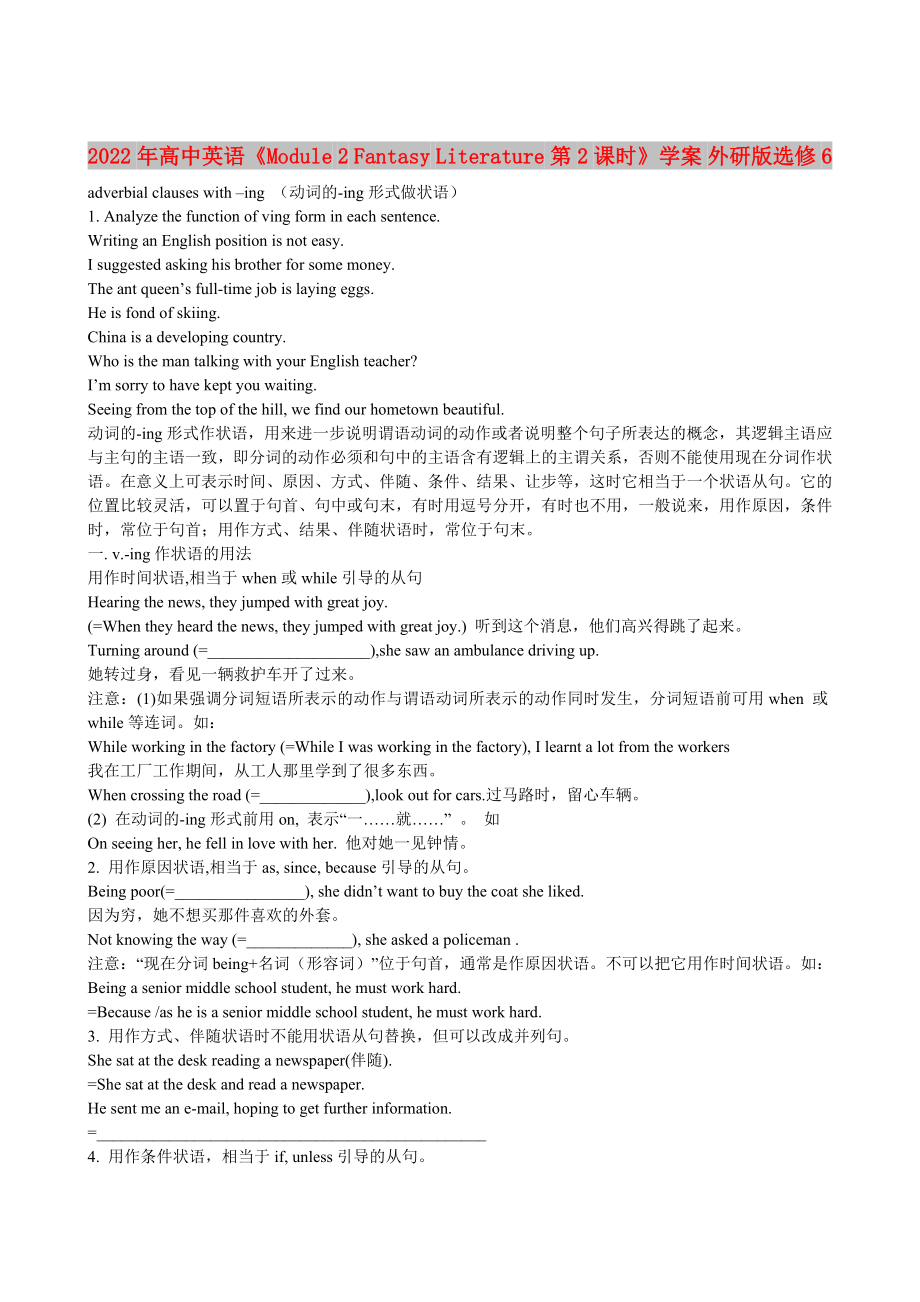《2022年高中英語(yǔ)《Module 2 Fantasy Literature 第2課時(shí)》學(xué)案 外研版選修6》由會(huì)員分享����,可在線閱讀,更多相關(guān)《2022年高中英語(yǔ)《Module 2 Fantasy Literature 第2課時(shí)》學(xué)案 外研版選修6(3頁(yè)珍藏版)》請(qǐng)?jiān)谘b配圖網(wǎng)上搜索��。
1����、2022年高中英語(yǔ)《Module 2 Fantasy Literature 第2課時(shí)》學(xué)案 外研版選修6
adverbial clauses with –ing (動(dòng)詞的-ing形式做狀語(yǔ))
1. Analyze the function of ving form in each sentence.
Writing an English position is not easy.
I suggested asking his brother for some money.
The ant queen’s full-time job is laying eggs.
He is fo
2、nd of skiing.
China is a developing country.
Who is the man talking with your English teacher?
I’m sorry to have kept you waiting.
Seeing from the top of the hill, we find our hometown beautiful.
動(dòng)詞的-ing形式作狀語(yǔ)����,用來(lái)進(jìn)一步說(shuō)明謂語(yǔ)動(dòng)詞的動(dòng)作或者說(shuō)明整個(gè)句子所表達(dá)的概念,其邏輯主語(yǔ)應(yīng)與主句的主語(yǔ)一致����,即分詞的動(dòng)作必須和句中的主語(yǔ)含有邏輯上的主謂關(guān)系,否則不能使用現(xiàn)在分詞作狀語(yǔ)�����。在意義
3�����、上可表示時(shí)間���、原因、方式、伴隨��、條件����、結(jié)果、讓步等����,這時(shí)它相當(dāng)于一個(gè)狀語(yǔ)從句。它的位置比較靈活��,可以置于句首�����、句中或句末��,有時(shí)用逗號(hào)分開(kāi)���,有時(shí)也不用��,一般說(shuō)來(lái)�����,用作原因�����,條件時(shí)��,常位于句首�����;用作方式��、結(jié)果�����、伴隨狀語(yǔ)時(shí)��,常位于句末���。
一. v.-ing作狀語(yǔ)的用法
用作時(shí)間狀語(yǔ),相當(dāng)于when或while引導(dǎo)的從句
Hearing the news, they jumped with great joy.
(=When they heard the news, they jumped with great joy.) 聽(tīng)到這個(gè)消息,他們高興得跳了起來(lái)��。
Turning around
4��、(=____________________),she saw an ambulance driving up.
她轉(zhuǎn)過(guò)身,看見(jiàn)一輛救護(hù)車(chē)開(kāi)了過(guò)來(lái)�。
注意:(1)如果強(qiáng)調(diào)分詞短語(yǔ)所表示的動(dòng)作與謂語(yǔ)動(dòng)詞所表示的動(dòng)作同時(shí)發(fā)生,分詞短語(yǔ)前可用when 或while等連詞���。如:
While working in the factory (=While I was working in the factory), I learnt a lot from the workers
我在工廠工作期間��,從工人那里學(xué)到了很多東西�。
When crossing the road (=___________
5���、__),look out for cars.過(guò)馬路時(shí)���,留心車(chē)輛。
(2) 在動(dòng)詞的-ing形式前用on, 表示“一……就……” ���。 如
On seeing her, he fell in love with her. 他對(duì)她一見(jiàn)鐘情��。
2. 用作原因狀語(yǔ),相當(dāng)于as, since, because引導(dǎo)的從句���。
Being poor(=________________), she didn’t want to buy the coat she liked.
因?yàn)楦F,她不想買(mǎi)那件喜歡的外套��。
Not knowing the way (=_____________), she asked
6�、 a policeman .
注意:“現(xiàn)在分詞being+名詞(形容詞)”位于句首���,通常是作原因狀語(yǔ)。不可以把它用作時(shí)間狀語(yǔ)�。如:
Being a senior middle school student, he must work hard.
=Because /as he is a senior middle school student, he must work hard.
3. 用作方式、伴隨狀語(yǔ)時(shí)不能用狀語(yǔ)從句替換��,但可以改成并列句�。
She sat at the desk reading a newspaper(伴隨).
=She sat at the desk an
7、d read a newspaper.
He sent me an e-mail, hoping to get further information.
=________________________________________________
4. 用作條件狀語(yǔ)��,相當(dāng)于if, unless引導(dǎo)的從句�����。
Work hard, and you’ll succeed.
=If you work hard , you’ll succeed.= ____________________________
Turning to the right(=_________________
8����、),you’ll find a path leading to his cottage.
翻譯:___________________________________________
5. 表示結(jié)果(自然結(jié)果),相當(dāng)于so, so that等引導(dǎo)的從句。
His parents died, leaving the baby an orphan.
The bus was held up by the snowstorm, thus causing the delay.(副詞thus強(qiáng)調(diào)結(jié)果)
= The bus was held up by the snowstorm, so that
9��、 it caused the delay.
翻譯:____________________________________________
注意:不定式也可以作結(jié)果狀語(yǔ)�����,但表示出乎意料的結(jié)果�。如:
He hurried to the post office, only to find it was closed.
他急忙跑到郵局,不料卻發(fā)現(xiàn)已經(jīng)關(guān)門(mén)了�。
6. 用作讓步狀語(yǔ)時(shí)相當(dāng)于though, although等引導(dǎo)的從句
Admitting what he said (=_______________), I still think he hasn’t tried his bes
10、t.
盡管我承認(rèn)他的話(huà)�,我還是認(rèn)為他沒(méi)有盡全力。
二. 動(dòng)詞-ing形式的否定式
動(dòng)詞-ing形式的否定式通常是在v.-ing 形式前加not.無(wú)論在完成形式還是被動(dòng)形式里�,必須置于v.-ing形式之前。如:
Not knowing how to do it, he asked the teacher for advice.
Not having finished my work, I am still doing it day and night.
Not having been watered for a long time, the flower died.
三�、v.-in
11、g的時(shí)態(tài)和語(yǔ)態(tài)
現(xiàn)在分詞的時(shí)態(tài)分為一般式和完成式兩種�。一般式(主動(dòng)doing; 被動(dòng)being done)所表示的動(dòng)作與謂語(yǔ)動(dòng)詞所表示的動(dòng)作同時(shí)(或之后)發(fā)生。完成式(主動(dòng)having done;被動(dòng)having been done)所表示的動(dòng)作則在謂語(yǔ)動(dòng)詞所表示的動(dòng)作之前已經(jīng)發(fā)生��。
He hurried home, looking behind as he went.
Having lived in Shanghai for years, I know each part of it very well.
The large building being built down the
12�����、 street will be a hospital.
注意:現(xiàn)在分詞的完成式一般只作狀語(yǔ)����。
Having finished the work, I went home happily.
Rewrite the underlined part in each sentence, using non-finite verbs ( to do, doing or done).
When she was cooking in the kitchen, she burnt her finger.
While he worked in the workshop, he made many fr
13、iends there.
After he finished the meal, he turn on TV to watch a cartoon program.
Because he was highly praised by the manager, the man worked harder.
After we were shown the library. We were taken to visit the lab.
If you have another look, you will see the mistake in the sentence.
He stood i
14�、n the shade and waited for his friend.
He had an accident and lost his arm.
The boy who is running ahead of the other is my classmate.
The bike which are made in the factory are of good quality.
判斷正誤
1. While reading the book, the telephone rang.
2. Looking out through the window, the garden w
15、as beautiful.
注意:動(dòng)詞ing 形式作狀語(yǔ)時(shí)���,其邏輯主語(yǔ)必須與句子的主語(yǔ)一致���,且必須與句子的主語(yǔ)是邏輯上的主謂關(guān)系�����,動(dòng)詞ing 形式表示的動(dòng)作是次要?jiǎng)幼?。(一個(gè)主語(yǔ)多個(gè)動(dòng)作��。)
四���、獨(dú)立成分
(1) 有些分詞短語(yǔ)可以作獨(dú)立成分�����,用來(lái)解釋這個(gè)句子��,不受句子主語(yǔ)的限制����。
常見(jiàn)分詞短語(yǔ)有:
generally speaking(一般說(shuō)來(lái)), supposing(假設(shè)), judging from / by (從…判斷)…
Generally speaking, girls are more careful than boys.
Supposing you lose,
16�����、what will you do?
Judging from his accent, he must be from the south.
(2) 分詞短語(yǔ)作狀語(yǔ)時(shí),它的邏輯主語(yǔ)一般需與句子的主語(yǔ)一致��。但有時(shí)它也可以有自己獨(dú)立的邏輯主語(yǔ)��,這種結(jié)構(gòu)稱(chēng)為獨(dú)立主格結(jié)構(gòu)�����。獨(dú)立主格結(jié)構(gòu)通常用來(lái)表示伴隨的動(dòng)作或情況��,有時(shí)還可以表示時(shí)間�、原因或條件�����。如:
Night ing on(=When night came on), we started for home.
So many people being absent (=___________), they decided to put off the meeting.
這么多人沒(méi)來(lái)����,他們決定會(huì)議延期舉行。
如果天氣允許的話(huà)��,我們就步行到那里���。______________________________
 2022年高中英語(yǔ)《Module 2 Fantasy Literature 第2課時(shí)》學(xué)案 外研版選修6
2022年高中英語(yǔ)《Module 2 Fantasy Literature 第2課時(shí)》學(xué)案 外研版選修6

